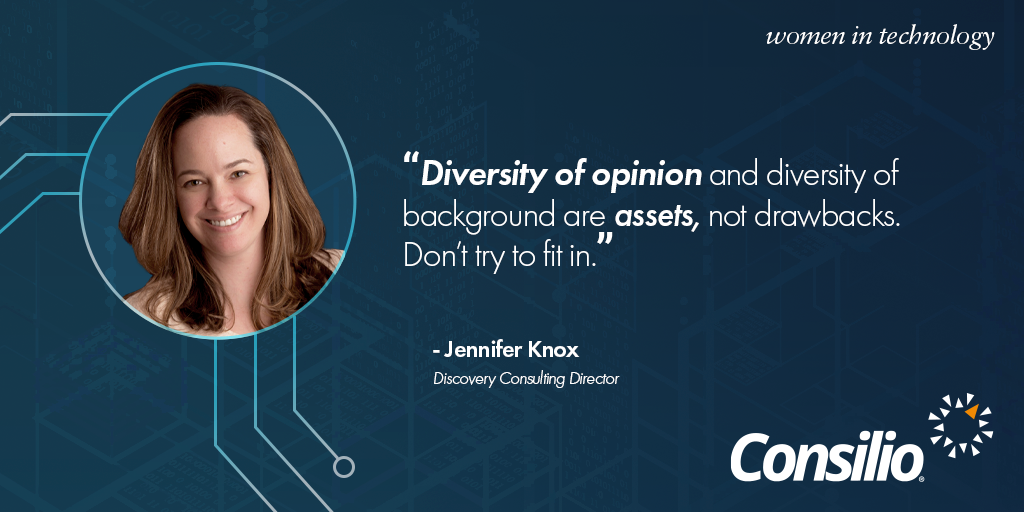 This blog is part of our ongoing Women in Technology series.
This blog is part of our ongoing Women in Technology series.
Jennifer Knox works with Consilio’s enterprise clients on various eDiscovery and data management issues. This often involves sensitive data analytics, document categorization, and Microsoft365 cloud functionality. Jennifer frequently speaks on these topics to clients and at industry events. Before joining the Discovery Consulting group, Jennifer managed the teams responsible for Consilio’s world-class operational and technology solutions, delivering fast, accurate, secure, and scalable data solutions for clients. In prior roles, Jennifer was SVP of Legal Technology at Bank of America, responsible for delivering technical solutions to the Legal, Compliance, and Regulatory Audit divisions.
How did you get into this industry?
I started in the industry in 2001, back when we all called it “litigation support” rather than eDiscovery. I worked for a software company that developed a document review tool called Introspect, celebrated worldwide for having an inscrutable load file format. Then, I joined Bank of America’s growing eDiscovery Technology and Operations group, where I led the technology development, driving the custodian & data management, data collection, and legal hold efforts. Finally, in 2015 I moved over to a company that would soon join the Consilio umbrella. In my six years at Consilio, I’ve worn many hats ranging from managing operational teams to dabbling in data privacy initiatives. My current role in Discovery Consulting blends my historical in-house Legal Tech experience with new organizations and problems to solve.
What were some pivotal moments in your career that helped to get you to where you are today?
During my career, I’ve tried to remain curious. This often means identifying the people “in the know” and learning how things work from those closest to the tasks. Sometimes curiosity involves researching how to learn a new skill or technology. Additionally, I’ve been blessed with great mentors, both formal and informal. Surrounding yourself with reliable and practical people pays off when you need sound advice.
Have you ever noticed a time in your career where your gender proved to differentiate you?
I remember scenarios where my ideas were not taken as seriously because of my gender, and I can easily recall the anger and frustration I felt at the time. Most women are familiar with their voices being silenced in a meeting. Or with their ideas being regurgitated by a male colleague and therefore given more weight. The best I can do is not perpetuate those biases in my work and professional dealings by listening to all voices equally and creating space for diverse viewpoints.
What is your advice for someone working in a predominately male workplace?
Diversity of opinion and diversity of background are assets, not drawbacks. Don’t try to fit in.
What do you think companies could do to motivate more women to pursue careers in technology?
The answer here is twofold: First, invest in younger girls and women. Many organizations are dedicated to teaching younger people STEM or coding skills, so highlight those organizations with your money and clout. Secondly, focus on who gets into the pipeline for new opportunities, who gets interviews, and who gets hired. Train hiring managers to recognize and reduce their biases. Finally, train all employees to seek feedback from a diverse audience.